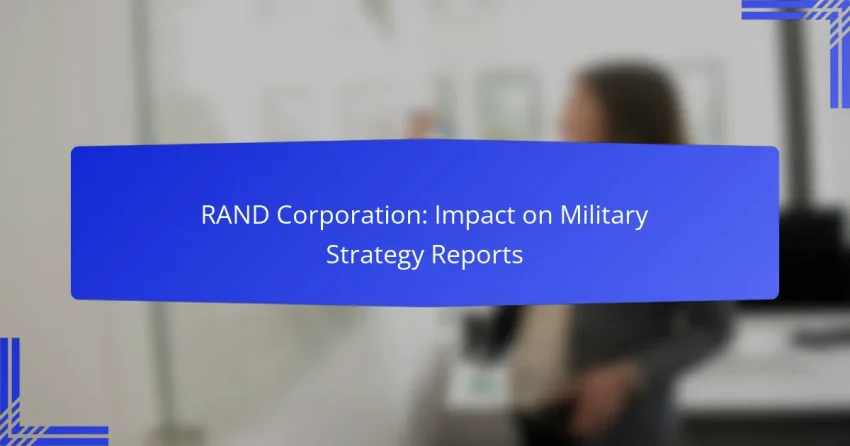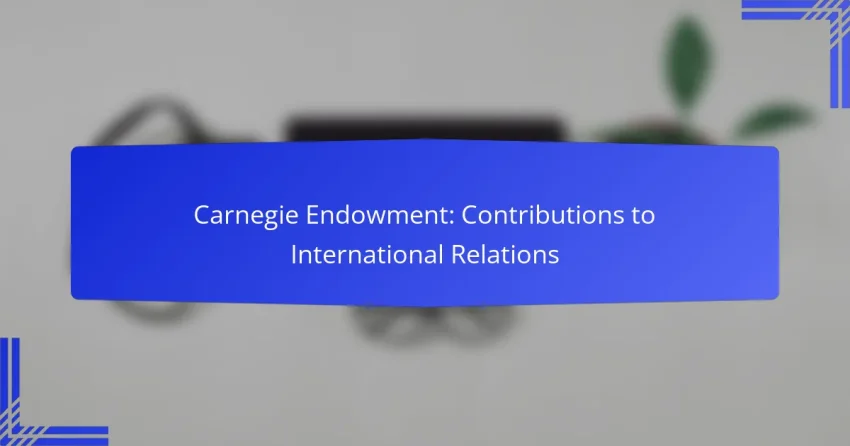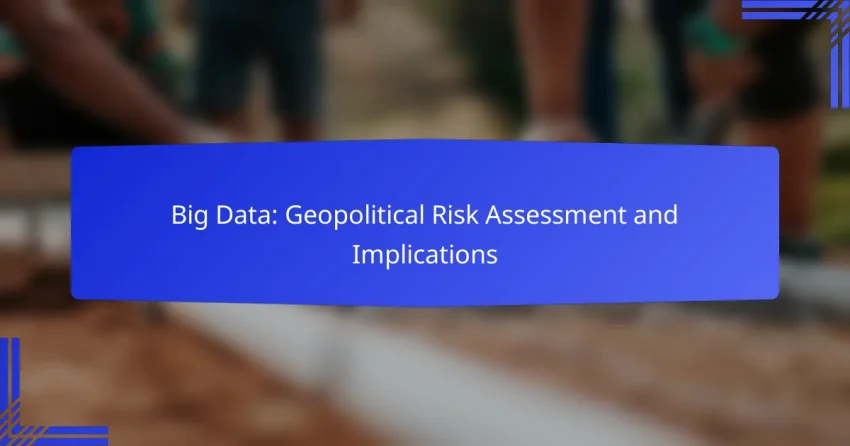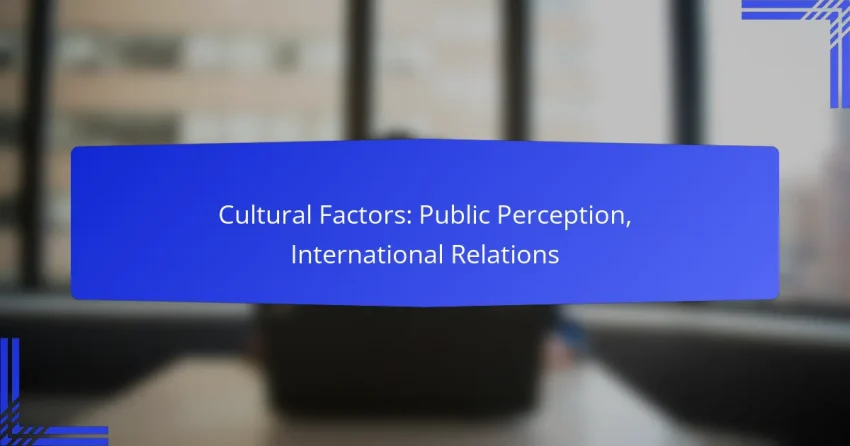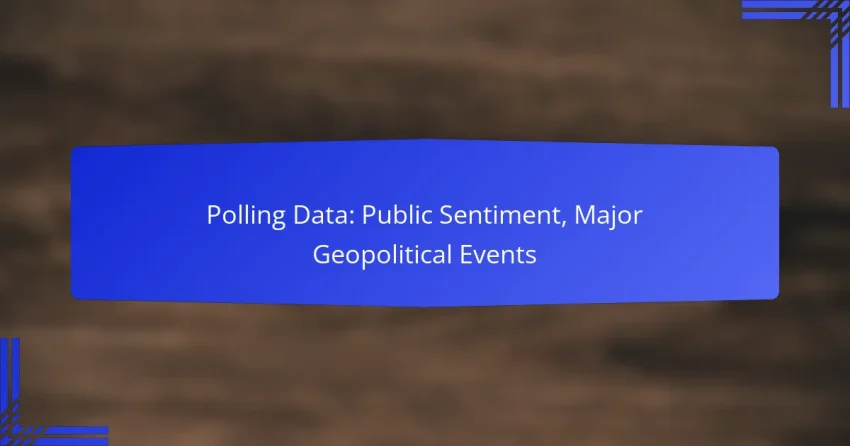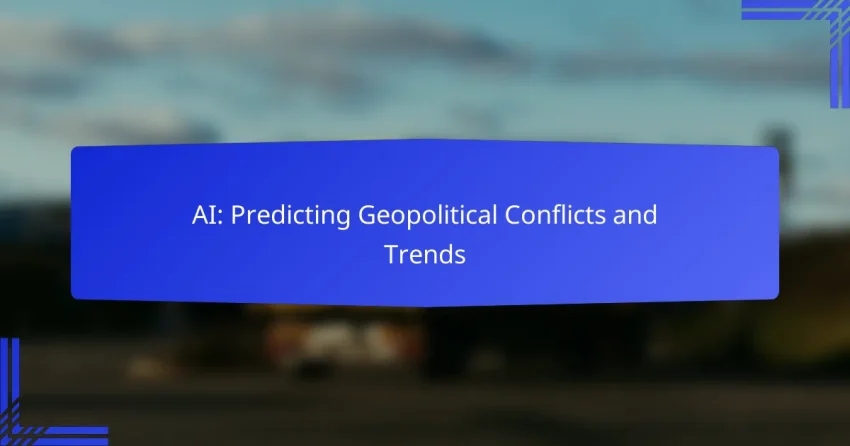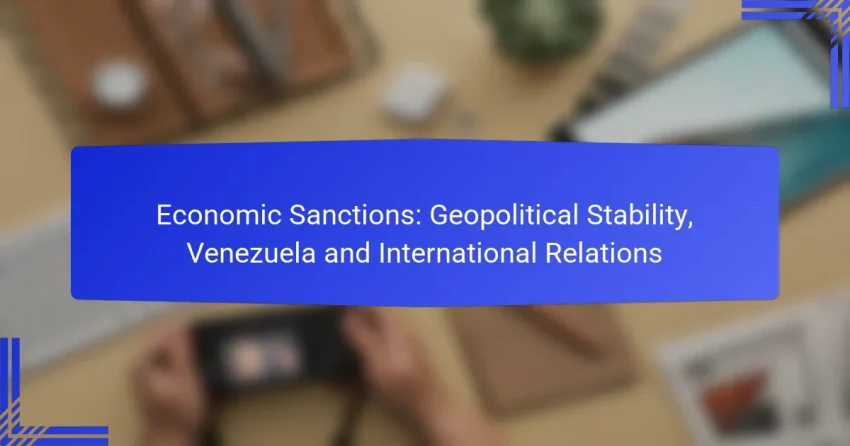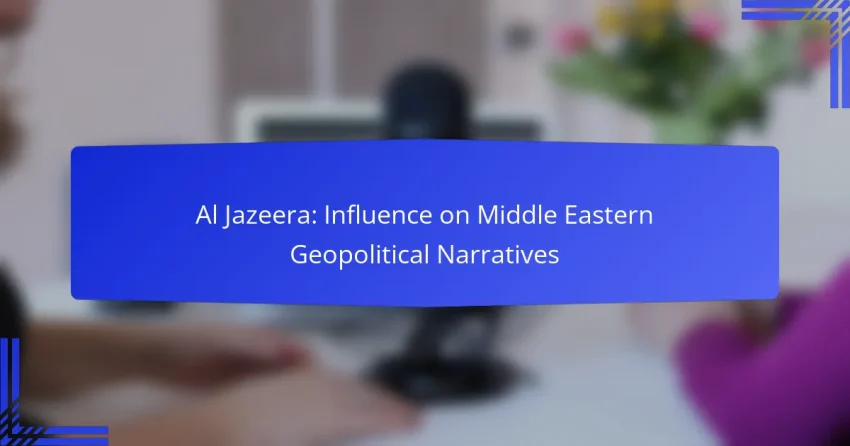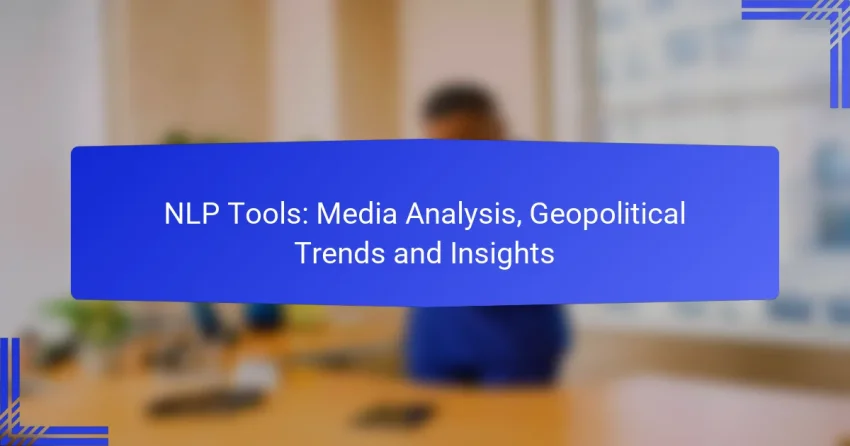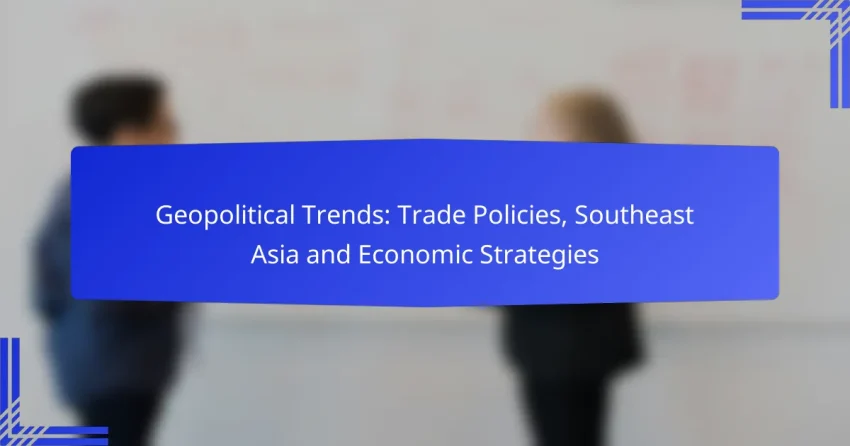The RAND Corporation plays a crucial role in shaping military strategy through its extensive research and analysis. By providing evidence-based insights and strategic frameworks, RAND’s reports equip military leaders with the knowledge needed to navigate current trends, assess risks, and formulate effective strategies for future conflicts. How Does RAND Corporation Influence Military Strategy? RAND Corporation…
Geopolitical trends play a crucial role in shaping media narratives and influencing audience perceptions. By understanding these dynamics, media professionals can tailor their strategies to ensure relevance and accuracy in their reporting. Analyzing these trends allows for a more nuanced approach to coverage, reflecting the complexities of international relations and political climates.
Carnegie Endowment: Contributions to International Relations
The Carnegie Endowment for International Peace has played a pivotal role in shaping international relations through its extensive research, global initiatives, and influential publications. By focusing on critical areas such as conflict resolution, democracy, and international security, it fosters dialogue and provides in-depth analysis essential for addressing global challenges and promoting peace. How Has the…
Big Data: Geopolitical Risk Assessment and Implications
Big data plays a pivotal role in assessing geopolitical risks by analyzing extensive information from diverse sources to uncover patterns and forecast potential conflicts. This capability empowers governments and organizations to make informed decisions, shaping strategies in investment, supply chain management, and market entry while effectively mitigating risks associated with geopolitical uncertainties. How Can Big…
Cultural Factors: Public Perception, International Relations
Cultural factors play a crucial role in shaping public perception, influencing how individuals interpret information and engage with one another. Elements such as national identity, religious beliefs, and language barriers significantly impact international relations, affecting diplomatic interactions and cooperation between countries. Understanding these cultural dynamics is essential for fostering effective communication and building strong relationships…
Polling Data: Public Sentiment, Major Geopolitical Events
Polling data serves as a vital resource for understanding public sentiment surrounding major geopolitical events. By reflecting the opinions and attitudes of the populace, these polls illuminate how significant occurrences, such as elections and international conflicts, shape perceptions of stability and trust. This information is not only essential for policymakers but also enables businesses to…
AI: Predicting Geopolitical Conflicts and Trends
AI is revolutionizing the way we predict geopolitical conflicts by analyzing extensive datasets to uncover patterns that signal potential instability. Utilizing advanced algorithms and real-time information, these AI systems provide valuable insights into emerging trends and risks across different regions, enabling countries to enhance their strategic planning and decision-making processes. How Can AI Predict Geopolitical…
Economic Sanctions: Geopolitical Stability, Venezuela and International Relations
Economic sanctions imposed on Venezuela have profound implications for its geopolitical stability, severely limiting access to international markets and resources. Targeting key sectors such as oil and finance, these sanctions aim to pressure the government towards democratic reforms, while simultaneously reshaping international relations and altering global alliances. How Do Economic Sanctions Affect Venezuela’s Geopolitical Stability?…
Al Jazeera: Influence on Middle Eastern Geopolitical Narratives
Al Jazeera plays a pivotal role in shaping Middle Eastern geopolitical narratives by amplifying diverse voices and perspectives through its comprehensive news coverage. By employing investigative journalism and local correspondents, it enhances its credibility and influences public discourse, both regionally and internationally. Its unique focus on in-depth coverage of local issues sets it apart from…
NLP Tools: Media Analysis, Geopolitical Trends and Insights
NLP tools for media analysis are essential for extracting valuable insights from extensive text data, allowing organizations to identify trends, sentiments, and key topics. By leveraging advanced algorithms, these tools analyze content from diverse media sources, facilitating informed decision-making and enhancing understanding of geopolitical trends through the identification of patterns and public opinion. What Are…
Geopolitical Trends: Trade Policies, Southeast Asia and Economic Strategies
Trade policies play a crucial role in shaping the economic landscape of Southeast Asia, influencing import and export dynamics, investment flows, and regional cooperation. As countries in the region adopt innovative economic strategies focused on digital infrastructure and sustainable development, they aim to enhance resilience and competitiveness in an evolving global market. However, these policies…
What Are the Key Geopolitical Trends Impacting Media Analysis?
Key geopolitical trends significantly influence media analysis by shaping narratives, audience perceptions, and information dissemination. Understanding these trends helps media professionals adapt their strategies and content to remain relevant and accurate.
Rise of Populism
The rise of populism has transformed political landscapes worldwide, often leading to a shift in media narratives. Populist leaders frequently challenge established institutions, which can result in increased polarization and sensationalism in media coverage.
Media outlets may need to adjust their reporting styles to address the concerns of populist movements, focusing on grassroots issues and local sentiments. This requires a careful balance to avoid amplifying divisive rhetoric while still providing comprehensive coverage.
Shifts in Global Power Dynamics
Shifts in global power dynamics, particularly the rise of nations like China and India, are reshaping international relations and media narratives. These changes can lead to new alliances and tensions, affecting how information is reported and perceived globally.
Media analysts should consider the implications of these power shifts on regional stability and international cooperation. Understanding these dynamics can help in crafting content that resonates with diverse audiences and reflects emerging global perspectives.
Impact of Technology on Information Dissemination
Technology has revolutionized information dissemination, enabling faster and broader reach than ever before. Social media platforms and digital news outlets have become primary sources of information, often outpacing traditional media.
Media professionals must adapt to these changes by leveraging technology for real-time reporting and audience engagement. However, they should also be vigilant about misinformation and the challenges of maintaining journalistic integrity in a fast-paced digital environment.
Climate Change and Resource Conflicts
Climate change is increasingly recognized as a driver of geopolitical tensions and resource conflicts. As natural resources become scarcer, competition for water, energy, and arable land can lead to conflicts, which media must cover responsibly.
Media outlets should focus on the local impacts of climate change and resource management strategies. Highlighting community resilience and adaptation efforts can provide a more balanced perspective on these complex issues.
International Trade Agreements
International trade agreements play a crucial role in shaping economic relations and geopolitical stability. Changes in trade policies can have immediate effects on markets, industries, and employment, making them essential topics for media analysis.
Media professionals should stay informed about ongoing trade negotiations and their potential impacts on local economies. Providing clear, accessible explanations of trade agreements can help audiences understand their significance and implications.
How Do Geopolitical Trends Influence Media Coverage?
Geopolitical trends significantly shape media coverage by determining which stories receive attention and how they are presented. These trends can affect the framing, audience perception, and editorial policies of news organizations, leading to variations in reporting based on political climates and international relations.
Framing of News Stories
The framing of news stories is influenced by geopolitical contexts, which can dictate the narrative around specific events. For instance, a conflict may be portrayed as a struggle for freedom in one country while being depicted as a threat to stability in another. This selective framing can lead to polarized views among audiences.
Media outlets often adopt frames that align with their audience's beliefs or the political stance of their country. For example, Western media might focus on human rights violations in authoritarian regimes, while state-controlled media in those countries may emphasize national security and sovereignty.
Shifts in Audience Perception
Geopolitical trends can lead to shifts in audience perception, as public opinion is often swayed by how issues are reported. When media coverage highlights certain geopolitical narratives, it can create a sense of urgency or fear among the audience, influencing their views on foreign policy and international relations.
For example, increased coverage of a country's military actions can lead to heightened public concern about national security, prompting calls for government action. Conversely, positive coverage of diplomatic efforts can foster a sense of optimism and support for international cooperation.
Changes in Editorial Policies
Changes in geopolitical dynamics often result in shifts in editorial policies within media organizations. News outlets may adjust their reporting guidelines to align with government positions or public sentiment, particularly during times of crisis or conflict. This can lead to self-censorship or biased reporting.
For instance, during a geopolitical crisis, a media outlet may prioritize coverage that supports national interests, potentially sidelining critical perspectives. It is essential for consumers of news to recognize these shifts and seek diverse sources to gain a well-rounded understanding of global events.
What Are the Best Practices for Analyzing Media in a Geopolitical Context?
Effective media analysis in a geopolitical context involves systematic approaches that consider data, diverse viewpoints, and current trends. By employing these best practices, analysts can derive insights that reflect the complexities of global affairs.
Utilizing Data Analytics Tools
Data analytics tools are essential for processing large volumes of media content and identifying patterns. These tools can help analysts track sentiment, frequency of topics, and engagement levels across different platforms. Popular tools include Google Analytics, Tableau, and specialized media monitoring services.
When selecting analytics tools, consider their ability to integrate with various data sources and provide real-time insights. A combination of quantitative metrics and qualitative analysis will yield a more comprehensive understanding of media narratives.
Incorporating Diverse Perspectives
Incorporating diverse perspectives is crucial for a well-rounded media analysis. This means engaging with viewpoints from different regions, cultures, and political backgrounds to avoid bias. Analysts should actively seek out sources from various media outlets, including international news, local publications, and independent journalists.
To facilitate this, create a list of reliable sources that represent a range of perspectives. Regularly update this list to include emerging voices and ensure that the analysis remains relevant and comprehensive.
Monitoring Social Media Trends
Social media trends provide real-time insights into public sentiment and emerging geopolitical issues. Platforms like Twitter, Facebook, and Instagram can reveal how narratives evolve and how they are perceived by different audiences. Monitoring tools like Hootsuite or Sprout Social can assist in tracking these trends effectively.
Establish a routine for monitoring social media, focusing on key hashtags and influencers relevant to geopolitical topics. This practice can help identify shifts in public opinion and emerging stories that may not yet be covered by traditional media outlets.
How Can Businesses Leverage Geopolitical Insights for Strategic Decisions?
Businesses can leverage geopolitical insights by analyzing global trends to inform their strategic decisions. Understanding the political landscape helps companies anticipate market shifts, manage risks, and optimize their operations in various regions.
Market Entry Strategies
When entering new markets, businesses should assess the geopolitical climate to identify opportunities and challenges. Factors such as trade agreements, political stability, and regulatory environments can significantly impact market entry success.
For example, a company considering expansion into Eastern Europe should evaluate the European Union's regulations and local political dynamics. Developing a tailored market entry strategy that aligns with these insights can enhance competitiveness and reduce barriers.
Risk Management Approaches
Effective risk management requires businesses to stay informed about geopolitical developments that may affect their operations. This includes monitoring international relations, economic sanctions, and potential conflicts that could disrupt supply chains.
Companies should implement a risk assessment framework that incorporates geopolitical factors, allowing them to proactively address vulnerabilities. Regular scenario planning can help organizations prepare for various outcomes, ensuring resilience in uncertain environments.
Brand Positioning in Global Markets
Brand positioning in global markets should reflect an understanding of local cultures and geopolitical contexts. Companies must adapt their messaging and offerings to resonate with diverse audiences while considering regional sensitivities.
For instance, a brand entering the Middle East may need to tailor its marketing strategies to align with local customs and values. Engaging local influencers and conducting market research can enhance brand acceptance and strengthen customer relationships.
What Frameworks Exist for Evaluating Media Bias in Geopolitical Reporting?
Several frameworks help assess media bias in geopolitical reporting, focusing on the source's perspective, reliability, and presentation style. These frameworks often categorize outlets based on their political leanings and fact-checking rigor, providing a clearer understanding of potential biases in news coverage.
Media Bias Chart Analysis
The Media Bias Chart is a popular tool that visually represents the political bias and reliability of various news sources. It categorizes outlets along a spectrum from left to right, while also indicating their factual accuracy. Users can quickly identify which sources may present skewed perspectives on geopolitical issues.
When using the Media Bias Chart, consider the source's placement and its historical performance in reporting. For example, outlets in the center typically strive for balanced reporting, while those on the extremes may emphasize particular narratives. Regularly checking updates to the chart can help maintain an accurate understanding of the media landscape.
Fact-Checking Resources
Fact-checking resources are essential for verifying claims made in geopolitical reporting. Websites like Snopes, FactCheck.org, and PolitiFact provide thorough analyses of statements made by public figures and media outlets, helping to clarify misinformation. These platforms often include references to original sources, enhancing transparency.
To effectively use fact-checking resources, cross-reference claims with multiple sources and pay attention to the date of the analysis. This ensures that the information is current and relevant. Additionally, be cautious of confirmation bias; seek out fact-checks that challenge your preconceptions to gain a well-rounded perspective on geopolitical narratives.
